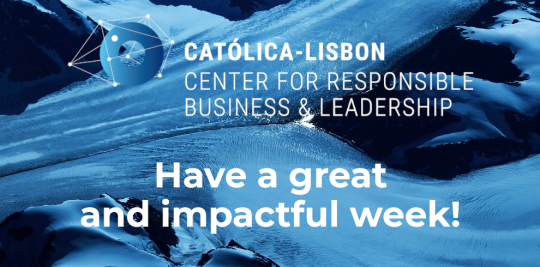
Key messages from Davos 2020
World Economic Forum
January 26th 2020 - Edition #19
The so called “Davos Forum” happened this week and marked the 50th anniversary of the first World Economic Forum (WEF). The main ambition of the Forum was to contribute to the next 50 years of economic development, helping to shape a prosperous future for humanity, where companies and countries play a central role.
Key messages from the event:
- “Capitalism, as we know it, is dead”
Klaus Schwab launched the new Davos Manifesto to ensure that stakeholder capitalism delivers on its potential to tackle today's environmental and social challenges. He called all actors to compromise with net zero emissions by 2050. Finland will do it in 2035.
Marc Benioff, CEO of Salesforce, announced the end of capitalism as we know it and affirmed the obsession on maximising profits for shareholders is a wrong idea.
“It's in the long-term interest of the shareholders that we do the right thing to the stakeholders”, Microsoft CEO Satya Nadella. Companies on the forum showed a compromise for this change.
- Climate change is real and we cannot deny it anymore
Discussion on “do we have an issue?” is over. Time for action is now. The overwhelming majority of business and state leaders at Davos were clear about the need to fight climate change as the priority for the next decade. Christine Lagarde mentioned we need to create pressure if we want people to act. USA compromised to join the one trillion trees initiative by WEF.
“The question of whether we will attain the Paris goals on climate change may well be one of survival for the whole planet, said Chancellor Angela Merkel.
- We need to act together on our collective changes
Many chiefs of state emphasised the need to work together on solving world's biggest challenges, when we are only 10 years from the deadline to deliver the Sustainable Development Goals.
Joseph Stiglitz highlighted that “even if it’s up to companies to act for change, governments have a crucial role setting the basis for action”. As referred by another panel member “as we act together, we need to reskill one billion people by 2030. It was stated that in the 4th Industrial Revolution 100% of jobs will change, so we need a change of paradigm around skills, to value skills not just degrees, develop new educational models and learning pathways to get retain and bring people back into the workforce.
Other worth mentioning facts from the Conference:
- Ghanaian cardinal Peter Kodwo Turkson delivered a special message from Pope Francis. He called on everyone to remember that we are all members of one human family, and that we have a moral obligation to care for one another. He asked for a renewed ethical approach in the forthcoming discussions, including in the discipline of economics.
- In a conversation with the young people of the world, António Guterres, as secretary general of UN, advised to be the safeguard on humanity and nature interests and keep empathy, equality and education as priorities for a better future.
- Prince Charles announced the recently launched Sustainable Markets initiative that will put people and planet at the heart of global value creation.
- In partnership with the “big four”, WEF announced the launching of a common, system-wide ESG metrics, aligned with SDGs, so companies’ reports can be comparable and evaluated in term of sustainable business development. This would be a big step on the companies’ sustainable agenda.
- A new platform to solve world challenges was launched, UpLink, that will connect the next generation of change-makers and social entrepreneurs to networks of leaders who have the resources, expertise, and experience to create an impact. The objective is to forge new approaches to address the world’s most pressing challenges, as set in the United Nation’s Sustainable Development Goals (SDGs). Moreover, Børge Brende, President of WEF, announced a new multi-stakeholder partnership - SDG 500 - to mobilise $500 million towards achieving the SDGs in emerging markets.
- The whole issue around the tax system is gaining new impetus. “We need to have tax justice in order to have social justice”. However, corporate tax rates have declined as the digital economy has boomed. Participants mentioned we need to do something about it and for that, OECD is launching a supranational understanding on digital taxation. António Guterres mentioned about that "We need to put a price on carbon. It has a real impact that has to be priced. We need to shift taxation from income to carbon, which is a win-win situation. As a taxpayer I can't accept the idea my taxes are being used to ... bleach corals or melt glaciers."
And if you are still curious on the back the scenes in DAVOS check out the fresh released documentary: The Forum, a movie by Marcus Vetter.
Have a great and impactful week!
Center for Responsible Business and Leadership
The Center for Responsible Business & Leadership has the main purpose of contributing for Sustainability and Responsible Leadership to become part of the “way we do things in our planet”. Find out more here.
"Have a Great and Impactful Week!" is the weekly newsletter from CATÓLICA-LISBON's Center for Responsible Business & Leadership. You can subscribe to "Have a Great and Impactful Week!" here.
"Have a Great and Impactful Week!" is sent out every Sunday at 5PM, bringing new insights on the world of corporate responsibility, sustainability and responsible leadership. It is often signed by the Center's Executive Director, Nuno Moreira da Cruz.